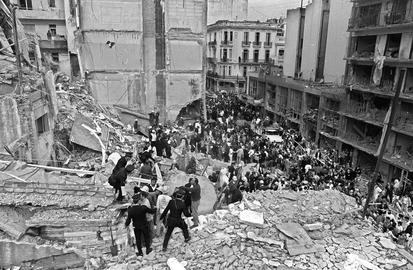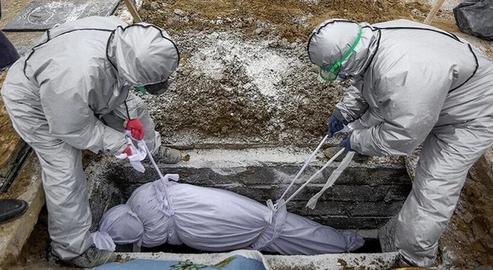The new President of Iran, Ebraim Raisi, presented the rest of his planned all-male cabinet on Wednesday, August 11. One name that stood out was that of Ahmad Vahidi. The new Interior Minister is an ex-IRGC Quds Force commander, wanted by Interpol since 2007 for his alleged role in the July 1994 bomb attack on the Asociación Mutual Israelita Argentina (AMIA) building in Buenos Aires, Argentina, which killed 85 people and injured hundreds of others.
The bombing was the worst terror attack, and the single most horrific antisemitic incident, in the contemporary history of South America. Apart from being accused of having a role in the plot, Vahidi formerly served as Minister of Defense between 2009 and 2013 during the presidency of Mahmoud Ahmadinejad, whose Holocaust-denying comments sparked international revulsion. Ahmadinejad also signed Iran's secretive pact with the Argentine government of Cristina Kirchner in 2013, which helped to absolve Iranians involved in the bombing for years to come.
Ahmad Vahidi was sanctioned by the US Obama administration in 2010 for “helping Iran fund nuclear and missile programs and evade international sanctions”. Then in 2011, during a brazen ministerial tour of Latin America, Vahidi attended two meetings with then-Bolivian President Evo Morales. So controversial were these appointments that the Argentine government made a public complaint, forcing Vahidi to conclude the trip early and the Bolivian state to apoligize.
Since then, Vahidi has been largely absent from the international stage and played a lesser role in Iranian public life. But in his new role he remains both sanctioned and a wanted man.
Vahidi’s Alleged Involvement in the AMIA Bombing
At the time of the AMIA atrocity, Ahmad Vahidi was commander of the IRGC’s expeditionary Quds Forces. Years after the bombing, the Argentine public prosecutor Alberto Nisman - who was later assassinated - would accuse Vahidi of being one of the ideological masterminds of the attack. Vahidi, Nisman said, had participated in a critical meeting in 1993 in the Iranian city of Mahshad, in which the bomb plot was formulated with the green light from Supreme Leader Ayatollah Khamenei.
“Vahidi did not limit himself to participating in that conclave passively,” Nisman wrote in his final report. “He also played a leading role in proposing that our country be the target. His suggestion was successful; indeed, this proposal was the one submitted to the Special Affairs Committee for examination.”
Once the target was agreed, Intelligence Minister Ali Fallahijan took charge of the plan’s execution together with Vahidi in his capacity as head of the Quds Force. In 2007, Interpol issued a Red Notice against Vahidi together with five others on request from the Argentine government in 2006, drawing the international community’s attention to his wanted status.
The other Iranian officials identified as having been involved in the plot are ex-President Ali Akbar Hahsemi Rafsanjani, former ministers Ali Fallahijan and Ali Akbar Veleyati, ex-IRGC commander Moshen Rezaei, former Head of Foreign Security Imad Fayez Moughnieh, the former cultural adviser of the Iranian embassy in Argentina, Mohsen Rabbani, and finally the third secretary of Iran’s diplomatic delegation in Buenos Aires, Reza Ashgari.
Argentina Reacts to Ahmad Vahidi’s Appointment
The Argentine Foreign Ministry slammed Vahidi's appointment as Interior Minister in a statement on Wednesday. "Argentina expresses once again its strongest condemnation of the nomination of Ahmad Vahidi to a ministerial post in Iran," it read. “The Republic declares the new nomination... an affront to Argentine justice, and to the victims of the brutal terrorist attack against the Argentine Israelite Mutual Association (AMIA).
"The Argentine government demands once again that the government of the Islamic Republic of Iran cooperate fully with Argentine justices, allowing people who have been accused of participating in the attack to be tried by the competent courts.”
The statement came even though Cristina Kirchner, the top politician accused of having struck the illicit deal to cover up Iranian involvement in the AMIA bombing, is the current Vice-President of Argentina. Since the now-infamous 2013 “Memorandum of Understanding” with the Iranian regime came to light, and since Nisman’s murder in 2016, the Argentine state has tried to reduce its relations with Iran to a bare minimum. Its diplomatic delegation in Tehran comprises just three people and exports to Iran have shrunk by about 50 percent.
The AMIA itself has also issued a statement in response to Ahmad Vahidi being awarded a cabinet position under Ebrahim Raisi. It called the appointment “inadmissible”, adding: “More than 27 years after the attack, AMIA once again expresses its firm demand for those responsible to be tried, with the constitutional guarantees offered by Argentine law.
“Seeing those accused of having participated in a crime against humanity, in which 85 people were killed and more than 300 injured, continue to enjoy impunity and be rewarded with high political positions, is painfully unacceptable.
The new president of the Islamic Republic, Ebraim Raisi, was a member of the Tehran “death panel” that sent thousands of political prisoners to be illegally executed in summer 1988, on the orders of Ayatollah Khomeini. His hardline new cabinet is now awaiting approval from the Iranian parliament.
Related coverage:
27 Years After the AMIA Bombing, an Argentine Victim's Voice Lives On
Meet the Islamic Republic of Iran's Fixers in Argentina
The Holocaust-Denying Cleric Bolstering Hezbollah in Argentina
Tip of the Iceberg: Hezbollah’s Narco-Terrorism in Latin America Exposed
The Man who Exposed Iran and Hezbollah's Clandestine Infiltration in Argentina
Threats, Explosives and the Tri–Border Area: The Shadow of Hezbollah Over Argentina
Iran's Overseas Propaganda: How Hezbollah Courted Argentina
Cover-ups, Clashes, and Iran-Argentina Relations: The Mysterious Death of Alberto Nisman
The Fringe Argentinian Leftist Implicated in Iran’s Bomb Attack “Cover-Up”
visit the accountability section
In this section of Iran Wire, you can contact the officials and launch your campaign for various problems


























comments